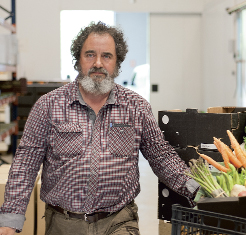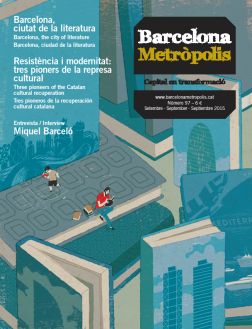Pescatarianism (vegetarianism plus fish), traditional bread baking with an innovative edge, strictly organic country produce… these are some of the options expanding gastronomic horizons in Barcelona and its area.
Through his restaurant Flax&Kale, Jordi Barri (Lleida, 1979) is paving the way for pescatarianism in Catalonia –a gastronomic trend that first took flight in New York and combines vegetarianism with small doses of oily fish. Xavier Barriga (Barcelona, 1969), founder of the bakery Can Turris, brings together cutting-edge methodology while preserving traditional techniques to recover the rich taste of bread from his childhood. Can Perol is a collective of six families of farmers, aged between 35 and 60, who are looking after people’s health and the environment with their organically-grown produce.

Photo: Albert Armengol
Jordi Barri, the pioneer of flexitarianism in Catalonia and founder of Flax&Kale restaurant.
Haute cuisine on pescatarian terms
Jordi Barri (1979, Lleida) was born the same year as the Paradís restaurant run by his parents, vegetarian chef Teresa Carles and entrepreneur Ramon Barri. “It was a small vegetarian restaurant, but it made a big impact in the Lleida area. There were always a lot of people, and they were mostly people from intellectual circles, university lecturers and writers”, he explains.
Having been a vegetarian since birth and surrounded by cookery books and sumptuous dishes, Jordi’s curiosity and interest were aroused. “There are some who rebel against their parents and do the opposite of them, but I grabbed the opportunity to devote myself to something I liked and that I could also combine with my true profession, finances and communication.” Having completed his studies in these two subjects, in 2011 Jordi Barri went on to open a restaurant in Barcelona – the hip and modern Teresa Carles – together with his sister Mar and his parents, with vegetarian food and an artistic flourish. It was then that he began his voyages around the world looking to gather up culinary ideas to bring innovation and novelty to his menu.
In 2014 he introduced the New York concept of pescatarianism to Catalonia and founded the restaurant Flax&Kale, “which is based on a vegetarian diet, but doesn’t rule out small portions of oily fish, rich in omega-3. It’s healthy and flexible eating”. The restaurant’s philosophy is to prioritise health, the reason why they gave it the name of two superfoods: kale, a variety of cabbage high in fibre, antioxidants and anti-inflammatories; and flax, also known as linseed, which is rich in omega-3 fatty acids. “People who come to Flax&Kale want to cultivate their vitality over the years, and are starting by introducing superfoods into their diet that will help achieve this goal.”
It is an idyllic setting where you can find cold-pressed green juices and where true culinary works of art, with ingredients cooked below 46 °C (to conserve all the enzymes), gluten-free and lactose-free dishes, and desserts with a low glycaemic index are all on offer. The restaurant is a great inspiration and a gastronomic paradise for lovers of healthy living and good food.
Classic bread, freshly made
The aroma of bread straight out of the oven fills the workshop of Can Turris on Carrer d’Aribau. Xavier Barriga (1969, Barcelona) is a baker who wanted to recapture the rich taste of bread from his childhood. He has returned to slower working methods, with longer fermentation periods and wholegrain flour, while avoiding genetically modified seeds.
Seven years ago Xavier opened his first workshop in Barcelona, later going on to create the Institut Turris, where he designs the bread varieties he offers, including breads with organic flour and some that are gluten-free. “We only use flour from trusted local producers. We’re currently bringing pseudocereals such as amaranth and buckwheat into the process”, he explains. They also make Nordic breads, prepared with rye, but one of the delicacies that has caused the greatest stir has been the spring, winter, summer and autumn breads. “They carry more fibre, because they include dried tomatoes, carrot and broccoli.” The spices and seeds also give these creations a slightly exotic flavour, surprising even the most demanding of palates.
Born into the midst of a family of bakers, Xavier’s father passed down his fondness for the bread-making process. “From the smell of the freshly baked bread to the moment you put flour on your hands to knead the dough, you’re following an artisanal process that has a bit of magic in it.” He fell in love with the art of bread making as an adolescent in the family workshop, and when he was twenty-three he visited Portugal, Italy, France and Denmark to train, attend courses and begin to contribute to specialist magazines.
Knowledge of the most innovative methods united with the preservation of certain traditional techniques makes Xavier Barriga’s bread modern but highly authentic in equal measure. “We make our starter without yeast, just flour and water. This is the natural method that was used to make bread rise in ancient times”, he affirms.
This dough is left to ferment at room temperature and water and strong flour are added whenever necessary. “A longer fermentation allows the baker and the rest of the team to have a life during the day and sleep at nights.” The taste of the bread is different, too: the soft part is denser, the crust crunchy and a tiny bit caramelised, with hints of acidity and a robust texture that takes you back to years gone by. “Patience, time and respect are beneficial in the art of bringing bread to life”, he concludes.

Photo: Albert Armengol
Anna Molner, member of Can Perol, an organic farmers’ collective in Sant Vicenç dels Horts and the Tarragonès region.
Organic agriculture with heart
Joan Raventós and Anna Molner are part of Can Perol, a collective of six families of farmers aged between 35 and 60 who practice organic agriculture at Sant Vicenç dels Horts and in the Tarragona area. With their parents and grandparents having worked in the fields before them, they have inherited a respect for the land and turned it into their philosophy. “We practise organic agriculture because it’s a way of not harming the land. We look after around three hectares of varied seasonal crops and have four types of fruit trees: peach, cherry plums, cherries and olives”, Anna explains.
These land-working families have joined together, offering organic baskets to schools, families, cooperatives and online shoppers. “To avoid pesticides and toxins that contaminate the soil, we use the following methods: we leave gaps between the crops and the vegetation, to accommodate insects that are beneficial and eat aphids; we don’t use chemical fertilisers or genetically modified seeds; we practice crop rotation and diversification, allowing the soil to regenerate properly; and use agroecological methods to prevent harmful insects from eating the fruit and the vegetables”, says Joan. “This means leaving traps with bait, food that peach and olive fruit flies love, or releasing the insect’s female pheromone from two boxes set on each side of the fruit tree. The pheromone attracts the insects into the box, leaving the fruit unscathed. We don’t make much use of natural insecticides such as pyrethrum, only as a last resort, although they are allowed in organic agriculture and are biodegradable.”

Photo: Albert Armengol
Joan Raventós, member of Can Perol, an organic farmers’ collective in Sant Vicenç dels Horts and the Tarragonès region.
The farmers at Can Perol are also working towards helping local crops recover their standing. “We’ve helped bring back the white aubergine as well as native varieties of cole (espigalls and brotons de la col), chickpea (cigronet petit) and bean (mongeta del ganxet)”, adds Joan Raventós. Some of these genera had been lost, being less resistant to insects than other more commercial crops. “We have seasonal produce; our maxim is that we follow the rhythm of the land and its traditional growing calendar. When it’s not the season for tomatoes, we don’t offer them. But what we do practise in the Can Perol network of producers is that some of us put our efforts more into fruit and others into vegetables. The produce that we sell is sourced locally, because the majority of the producers are located in the Baix Llobregat and Tarragonès areas.”





Pingback: Barcelona, ciutat de literatura | Núvol